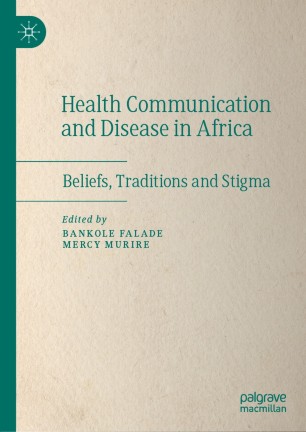Health information and communication strategies in Africa can be more effective if they take account of people's religious, traditional and cultural beliefs as well as their socio-economic circumstances.
This is one of the key messages of a new book edited by Drs Bankole Falade and Mercy Murire. Falade is a research fellow with the South African Research Chair in Science Communication at Stellenbosch University and Murire a senior researcher at the Wits Reproductive Health Institute at the University of the Witwatersrand.
Titled Health Communication and Disease in Africa: Beliefs, Traditions and Stigma (Palgrave Macmillan, 2021), the book comprises 17 chapters on different themes such as conceptual approaches for change, stigma and health, risk perception and health, reproductive health, traditions and beliefs, mental health, Western and indigenous communication, religion in health, and the huge financial costs of health. It includes contributions by authors from across Africa (Kenya, Nigeria, South Africa, Zimbabwe, Uganda, Malawi and Morocco), Europe and as far as Japan.
Falade says because health communication is not sufficient for behavioural change, these key issues should be considered when addressing the gaps in health services and the challenges related to the uptake of health information about communicable and non-communicable diseases in Africa.
He explains: “For example, to understand behavioural change in HIV prevention, we must first understand the role played by stigma, public shaming and self-shaming. We must also understand agency, poverty, and health systems, social and cultural values with regards to sex, who can and cannot have sex and when can they have sex, all of which drive people underground for unsafe sex."
Adds Falade: “To integrate those suffering from Alzheimer's disease, we must understand the disease, its origins and the stigmatisation of the ill. We also know that different social groups perceive risk differently – while obesity may be a clinical issue, in some African societies, being fat is the norm. We need to understand mental health, its causes, its social space in society and why people go to traditional healers instead of seeking clinical interventions or both."
He says research has shown that health behaviour is not determined by scientific factors alone.
“We should integrate African customs, traditions and socio-cultural practices into existing health systems as part of the process of changing health-disabling social norms. We should also integrate the African context and Western approaches.
“This can help to improve health communication in Africa, especially for people who live in rural areas and have very little access to newspapers and television."
Falade says the book couldn't have come at a better time as the issues they address are taking centre stage during the pandemic.
“We have seen how social groups perceive risk from the vaccines differently, the ongoing stigmatisation of those who refuse the vaccine, the role of conspiracy theories and social movements in health behaviour, the huge cost of eradicating disease, and inequalities between developed and developing countries."
According to Falade, the book shows that science communication is a social and cultural process and not just the transfer of knowledge from scientists to an undiscerning public.
“The public has common sense, a knowledge system on its own, which they will use to interpret messages from the scientists. The two systems of knowing need to meet and work together."
He says the challenges related to health communication and disease in Africa are not new; we just have not made the right choices and set the right policy priorities.
Falade adds that health practitioners, policymakers, researchers and students will benefit from the book.
FOR MEDIA ENQUIRIES ONLY
Dr Bankole Falade
South African Research Chair in Science Communication
Centre for Research on Evaluation, Science and Technology
Stellenbosch University
Email: bfalade@sun.ac.za
ISSUED BY
Martin Viljoen
Manager: Media
Corporate Communication and Marketing
Stellenbosch University
Tel: 021 808 4921
Email: viljoenm@sun.ac.za

